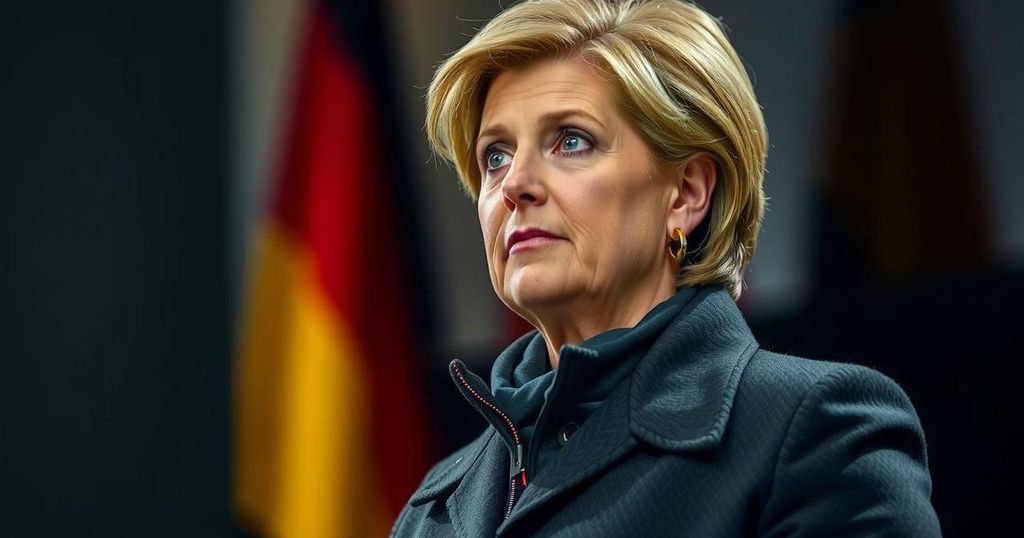World news
AIR FORCE, ALICE WEIDEL, ASIA, BLACKROCK, BUNDESTAG, CDU, CHINA, CHRISTIAN LINDNER, DEFENSE SPENDING, EUROPE, FDP, FRIEDRICH MERZ, GERMANY, GOVERNANCE, GOVERNMENT, HABECK, HAMBURG, IMMIGRATION POLICY, LIN, LINDNER, MER, MERZ, MEXICO, NORTH AMERICA, OLAF SCHOLZ, POLITICS, POPULISM, ROBERT HABECK, SAUERLAND, SCHOLZ, SRI LANKA, SWITZERLAND, WEIDEL
Fatima Alavi
0 Comments
Germany’s Chancellor Candidates for the 2025 Elections Unveiled
Germany’s political parties have nominated their candidates for the upcoming snap elections on February 23, 2025. Key figures include Olaf Scholz (SPD), Friedrich Merz (CDU), Robert Habeck (Greens), Alice Weidel (AfD), Christian Lindner (FDP), Sahra Wagenknecht (BSW), and Jan van Aken (Left Party). Each candidate represents distinct ideological perspectives, reflecting the complex political landscape of modern Germany.
In anticipation of the snap elections scheduled for February 23, 2025, Germany’s major political parties have nominated their leading candidates for the chancellorship. The candidates reflect a diverse political landscape, showcasing different backgrounds, ideologies, and experiences.
Olaf Scholz of the Social Democratic Party (SPD), born in 1958, presents himself as a pragmatic leader with substantial governmental experience, although he faces criticism regarding his perceived aloofness. Friedrich Merz of the Christian Democratic Union (CDU), the oldest candidate, is a conservative figure with a strong legal background and ties to major business entities.
Representing the Greens, Robert Habeck, born in 1969, is noted for his relatable and candid political style, often connecting with the public through straightforward communication. On the far-right, Alice Weidel of the Alternative for Germany (AfD) is characterized by her provocative rhetoric and critical stance on immigration.
Christian Lindner, the finance minister from the Free Democratic Party (FDP), at age 44, is recognized for his modern approach and social media presence, while Sahra Wagenknecht from the Left Party seeks to regain political standing through her populist messaging and skepticism of mainstream narratives. Finally, Jan van Aken, also from the Left Party and a former United Nations inspector, emphasizes his scientific background and political experience in striving for party relevance.
This election cycle is significant, marking a pivotal moment for Germany’s political future as varied candidates prepare to engage with pressing national issues.
The 2025 German federal election is poised to be a crucial event following changing dynamics in the political landscape. With a snap election approaching, parties need to select candidates who resonate with voter sentiments and convey their platform effectively. The diverse lineup of candidates spans various ideologies, from traditional conservatism to progressive policies, highlighting the spectrum of political discourse in contemporary Germany. This election also follows a period of turbulence in German politics, offering a chance for voters to redefine their priorities. Candidates such as Olaf Scholz, Friedrich Merz, and Alice Weidel are crucial in shaping the debate, as they navigate complex challenges such as economic stability, immigration, and climate change. Their differing backgrounds and experiences underscore the multifaceted nature of German democracy in 2025.
As Germany approaches the 2025 snap elections, the selection of chancellor candidates reflects an array of political ideologies and backgrounds. Each candidate brings unique qualifications and public perceptions that will influence their electoral campaigns. Factors such as leadership experience, party loyalty, and public engagement will play critical roles in determining the direction of Germany’s governance in the coming years. The diverse competition illustrates the challenges that parties must address concerning the electorate’s needs and aspirations.
Original Source: www.dw.com




Post Comment